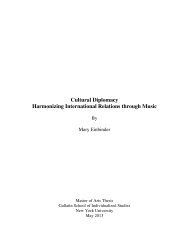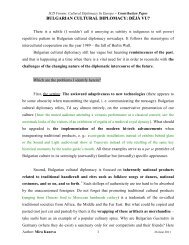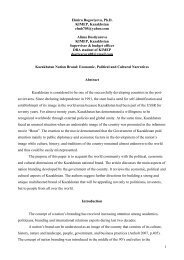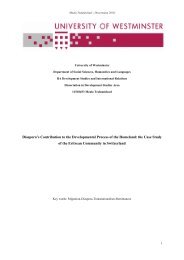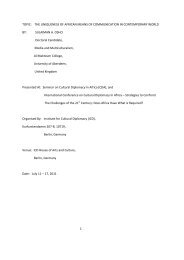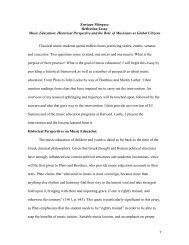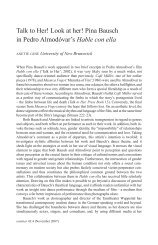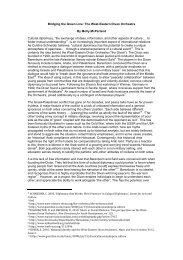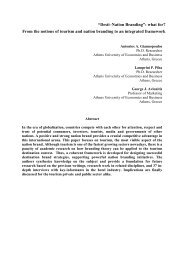Country Profiles: Germany - Institute for Cultural Diplomacy
Country Profiles: Germany - Institute for Cultural Diplomacy
Country Profiles: Germany - Institute for Cultural Diplomacy
You also want an ePaper? Increase the reach of your titles
YUMPU automatically turns print PDFs into web optimized ePapers that Google loves.
2. Methodology<br />
Be<strong>for</strong>e starting to assess whether there is cultural diplomacy in <strong>Germany</strong>, some methodological<br />
questions have to be addressed.<br />
First and <strong>for</strong>emost, it is necessary to define the scope of the report. What exactly does the<br />
report mean when talking about cultural diplomacy in <strong>Germany</strong>? Does it include cultural<br />
diplomacy conducted in the geographical entity named <strong>Germany</strong> by all relevant institutions,<br />
German and non-German? Is it only cultural diplomacy conducted by German institutions,<br />
organisations, foundations and individuals in and outside <strong>Germany</strong>? Or is it rather the actions<br />
undertaken by those German institutions solely within <strong>Germany</strong>? For this report it was agreed<br />
to include examples taking place in <strong>Germany</strong> or being carried out by German organisations<br />
abroad.<br />
Secondly, organisations or initiatives are seen as examples of cultural diplomacy when they<br />
have at least one of the following aims: To promote the exchange of ideas, in<strong>for</strong>mation,<br />
values, systems, traditions, beliefs, and other aspects of culture, with the intention of fostering<br />
mutual understanding. 77<br />
Third, the examples of activities and projects which can be defined as cultural diplomacy in<br />
<strong>Germany</strong>, making up the body of the report, are chosen bearing certain criteria in mind. These<br />
criteria are in line with a rationale of quality examples representing a diversity of projects<br />
and organisations. First of all, to maintain a diversity of examples, the report draws on<br />
initiatives from the public and private sector, as well as from civil society. In this report, the<br />
definitions of cultural diplomacy in the public and private sector, as well as civil society are as<br />
follows:<br />
� <strong>Cultural</strong> diplomacy in the public sector is taken to mean organisations or<br />
programmes initiated or currently directed by public institutions and offices.<br />
� <strong>Cultural</strong> diplomacy in the private sector: Foundations or programmes initiated or<br />
currently directed by private enterprises and business.<br />
� <strong>Cultural</strong> diplomacy in civil society: Foundations or programmes initiated or currently<br />
directed by civil society (NGOs, foundations, philanthropists).<br />
The rationale of quality combined with diversity was also central to selecting the examples <strong>for</strong><br />
each of the three sectors. As indicators of quality, the report primarily used awards,<br />
longevity (historical importance) and the programmes or organisation’s standing in <strong>Germany</strong>.<br />
With regards to the diversity of examples, this was ensured through the selection of examples<br />
which differed in themes and size. Thus, the report covers projects focusing on everything<br />
from educational exchange to the promotion of arts to intercultural dialogue through<br />
sports. Furthermore, the report attempts to strike a balance between organisations and<br />
initiatives acting on an international, national, regional and local level.<br />
Finally, it is important to note that this report on cultural diplomacy in <strong>Germany</strong> is intended to<br />
give an overview of the current state of affairs and does not purport to be a quantitative<br />
analysis of the situation.



